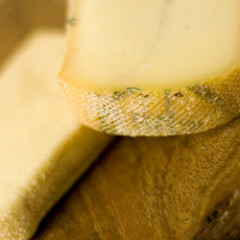I’m all for the support of organic farming methods but many people who care about animals wrongly believe that if they’re eating organic meat they’re eating cruelty free, environmentally friendly food. While this may apply to fruit and vegetable produce, the same certainly can’t be said for animals. Why do people so often confuse ‘organic’ with ‘cruelty free’, assuming that meat with an organic stamp of approval is somehow better for the earth? ‘Happy meat’ couldn’t be further from the truth. Here’s why…
Humane slaughter is an oxymoron
Much like ‘kind stabbing’, humane slaughter is a ludicrous term to describe the death of a sentient being. It simply doesn’t make sense. Whether an animal is raised on a factory farm, in a field or on the roof of the local pub, when the time comes for it to be turned into mince-meat, it is processed in the same way as any other animal raised for food. The journey may have been different but the ending is definitely the same. Anyone who believes organic meat is a product of minimal animal suffering is a victim of classic marketing strategies. The bottom line is this; eat as much organic food as you like as it is better for your health, just don’t believe it’s helping you save animals.
Organic meat is a myth
‘Natural’, ‘free range’, ‘organic’ … all great PR phrases we hear when buying into the organic meat industry. The only things these concepts really do, is lessen the guilt we feel about our purchase. Images of factory farmed animals slaughtered on a production line so quickly that they hardly have time to die before being skinned are now replaced by images of happy cows frolicking in fields and chickens dust bathing in the sun. While many of these ‘organic’ animals may be on a diet free of antibiotics, their conditions are often exactly the same as factory farmed animals, with the addition of a bit more space. Often animals raised on an organic farm are taken to the same slaughterhouse where factory farmed animals are killed too, thus nullifying the happy ending we’re led to believe that they have. The truth is that purchasing organic meat does nothing to better the life of the animal but it does do wonders for our sense of guilt! We’re charged more for food that makes us feel less guilty, essentially.
Not better for the environment
Organic animal farming is admirable, but it’s not sustainable when talking meat. Think of the demand for meat these days. Now take that demand and apply organic farming methods in order to meet it – every animal is required to have a certain amount of space and is to be fed on a diet free from antibiotics. How will that ever work on such a large scale? The amount of space we’ll need in order to keep organic animals is staggering, and land required for animals bred for food is already huge. That’s not to mention the amount of disease and sickness that will occur when said animals are processed on such a large scale without the use of antibiotics. About half the world’s land area that isn’t covered with sea is devoted to food production and while modern farming practices force this limited space to work, happy meat farming simply can’t, and animals suffer either way.
The green movement is fantastic but if you’re worried about the welfare of animals in the first place, you probably shouldn’t eat them at all – especially when there are many other organic and health foods that are far better for your health and that of the environment.
Anita Lyon is a Professional freelance SEO Copywriter and writes on various topics. If you are a vegetarian it is important to understand the processing of organic foods. Most stores is suppliers of organic foods and all natural products but it is best to buy all your products at a registered health store.

